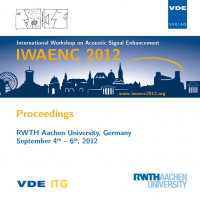Echo Reduction Using Wiener Gains Considering Short-Time Correlation Between Echo and Near-End Speech
Conference: IWAENC 2012 - International Workshop on Acoustic Signal Enhancement
09/04/2012 - 09/06/2012 at Aachen, Germany
Proceedings: IWAENC 2012
Pages: 4Language: englishTyp: PDF
Personal VDE Members are entitled to a 10% discount on this title
Authors:
Fukui, Masahiro; Nakagawa, Akira; Shimauchi, Suehiro; Haneda, Yoichi (NTT Media Intelligence Laboratories, NTT Corporation, Tokyo 180-8585, Japan)
Kataoka, Akitoshi (Faculty of Science and Technology, Ryukoku University, Shiga 520-2914, Japan)
Abstract:
This paper introduces a frequency-domain acoustic echo reduction process based on a new Weiner-filtering method assuming a short-time correlation between an acoustic echo and a near-end speech. The conventional echo reduction method based on Wiener filtering estimates the gain based on the assumption that acoustic echo and near-end speech are statistically independent. However, this assumption does not always hold true in practice because the gain is estimated in a very short period where the echo and near-end speech are not uncorrelated. As a result, the conventional method occasionally causes the perceptual degradation of sound quality during a double-talk situation; therefore, the performance is still not sufficient. Our goal was to accurately calculate the echoreduction gain to decrease the speech distortions produced by the echo-reduction process. The proposed method solves a least mean square error of theWeiner-filtering method by taking into account the short-time correlation between echo and near-end speech to obtain a better echo-reduction gain. The performance of this method was demonstrated by simulation results in which speech distortions were decreased. Index Terms — Acoustic echo canceller, echo reduction, and Wiener filtering


